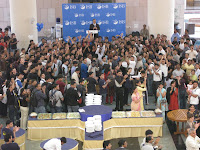Duke's question of the week is about teamwork and the differences between teams at ISB and those at Duke.
In both form and function, teams are essentially the same at both institutions. Teamwork is an important part of each course, usually comprising 25-40% of each course's workload and grading. At the beginning of the ISB school year, students were assigned to teams teams within their sections (very similar to the core course teamwork structure at Duke). At this point in the year though (the final weeks of the MBA program), students are allowed to choose their own groups, and teams are usually composed of 4-5 students. The ideal team interaction at ISB would involve every member having prepared the case prior to a team meeting, then analyzing the scenario as a group, learning from one another's diverse perspectives, and finally coming to an answer better than the sum of the individuals' independent solutions. In theory, that's the way teams should work at Duke too, right? ...But we all know that sometimes the ideal team interaction is sacrificed in the interest of time, sleep, and sanity! Just as at Duke, teams at ISB find their own ways of interacting and completing tasks too.
As with most new experiences, teamwork here took a bit of getting used to...
Little interaction, lots of trust: As a new student in the community with no prior interactions or trust with my randomly selected team members, I was surprised by the ease with which ISB students split up assignments (not worrying at all about my ability to complete a task - bold!) In several classes, I had to really push to get team meetings scheduled (as opposed to just dividing write-ups among the groups via email and compiling at the last minute), and I felt like the loud, dominant American team member. Other American exchange students expressed the same sentiment and the frustration with the lack of in-person interactions, timely submissions, and email communications within teams at ISB. Some students went through an entire term at ISB never having met face-to-face with their team members, which is very different from my experiences at Duke. That having been said, the students here have worked with one another for nearly a year, and they have established trust, norms, and ways of communicating which we, as exchange students, couldn't possibly understand...the same likely happens in every community over time.
Honor and accountability: As a general rule, it seems that the Duke students at ISB are more aware of Honor Code issues than our local colleagues. Students here must submit an Honor Code cover sheet with every assignment, but the institution doesn't seem to enforce its meaning as much as Duke does. Whereas the Honor Code at Duke is addressed in every class and is a frequent topic of discussion among teams and the larger Fuqua community, I have not sensed the same appreciation of the Honor Code in team interactions here. Most of my classes have not offered an evaluation process for team members, and accountability suffers as a result. Teams with one or two non-participating members seem to rely on the strong contributors to get the work done, but all members names are submitted with the assignment, and grades are given to everyone (in most cases) equally, regardless of the time or effort expended. In more than one exchange student conversation, I heard about team members who had never responded to a single email, written even one sentence for an assignment, or attended a team meeting for the entire term! Although these cases were surely the exception (and ISB students were in the middle of a stressful job placement process, to give these exceptional cases the benefit of the doubt), I'm more appreciative of the emphasis on team development, personal responsibility, and accountability at Fuqua than I was before this experience.
Phones ring, teammates answer: Although Duke students certainly have been known to surf the internet, send a text, or answer a quick call during team meetings, I was totally thrown off when team members here at ISB would carry on long phone conversations in team meetings. I spoke to two friends at ISB about the issue, and they thought it was so funny that I noticed such a thing, remembering their first experiences as professionals in the U.S. and the difference in accepted phone behavior between the two cultures. One woman stated that she was shocked to look around the cubicles in her New Jersey office and not see anyone chatting on their cells during the work day. Another said that she literally had no idea that her mobile had a "silent" function until she moved to the States for work. Prior to that experience, she simply left her ringer on and answered (regardless of if she was at her desk or in a meeting!) whenever it rang. Although I'm sure that different Indian (and American!) companies have their own phone etiquette, these friends' stories indicated that the behavior of some of my teammates here is typical among professionals and students alike in India.
In conclusion, there are more similarities than differences between teams at ISB and those at Duke. Individual teams each have their own norms and ways of coping, and while teamwork can be a really rewarding experience in some cases, it can be hellish in others - and that's true of teams anywhere in the world! However, being away from Duke makes me even more convinced that there's definitely something unique and special about "Team Fuqua."









